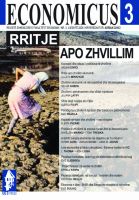A është barazia ekstreme një objektiv për t’u mburrur? Rasti i reformave agrare në Shqipëri
Is extreme equality an objective to boast? The case of agrarian reforms in Albania
Author(s): Fatmir Guri, Adrian CIVICI, Anne JouveSubject(s): National Economy, Agriculture, Financial Markets
Published by: Shtëpia botuese “UET Press”
Keywords: extreme equality; agrarian reforms in Albania;
Summary/Abstract: Historically, land administration in Albania has been directly related, like in a good number of countries, to the political system of the time. The study of organisation and structures that administered land remains a privileged research topic to urban economists, bearing in mind the radical changes that associated these structures along the last century. This article presents a general view of evolution of land structures during the last century. The main objective of our analysis is the comparison of the characteristics of agrarian reforms applied in Albania during 1930 – 1990 and the analysis of their effects on the structures of country’s farm land. The article is made up of five sections. The first section analyses land administration from the time Albania proclaimed its independence up to WW II with the reforms carried out by King Zog I. The second section explains the evolution of land structures in the aftermath of WW II with the 1946 reform. The third section focuses on de-collectivisation process in 1991 and the dissolution of all forms of collective ownership in agriculture. The fourth section makes a comparative analysis of the three agrarian reforms applied in the Albanian agriculture during the last century, the inspiring ideological support, as well as a comparison of results. Finally, there is a listing of results on the development of agrarian structures in the country. The main objective of this article is to demonstrate that the agrarian reforms recently applied in Albania instead of fulfilling their goal of improving the situation of rural population as well as ensuring social peace, they have caused the counter effects. They have increased the land-related conflicts at village level, increasing as consequence land-related insecurity, reducing this way the efficiency of using this resource.
Journal: ECONOMICUS
- Issue Year: 3/2009
- Issue No: 1
- Page Range: 97-108
- Page Count: 12
- Language: Albanian

